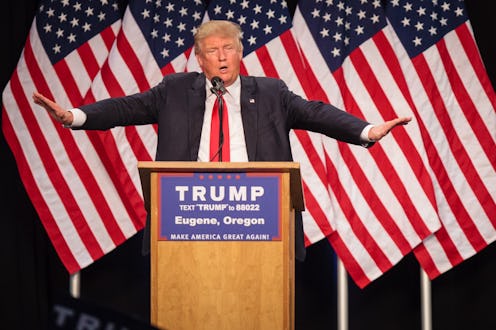News
This Is How Many Delegates Trump Needs
Donald Trump is the last candidate actively running for the Republican nomination, but states are still holding their primaries, with Sen. Ted Cruz and Gov. John Kasich remaining on the ballot. Trump was declared the presumptive nominee by Reince Priebus, chairman of the Republican National Committee, on May 3, but he still needs to secure 1,237 delegates to be the official nominee. Though he's close, some voters are still trying to play a game of keep-away. How many delegates does Trump need to win the nomination?
After Oregon's primary on Tuesday, Trump has 1,160 delegates. That means he only needs 77 more. There are 347 delegates remaining to be won in the primaries. He will almost certainly secure the 77 he needs, but it won't happen until the last day of Republican primaries on June 7. The only contest between Oregon and June 7 is in Washington on May 24, and the state only has 44 delegates.
Disenchanted Republican voters are showing up to the polls and continuing to vote for Cruz and Kasich despite the fact that they have suspended their campaigns. About 33 percent of those who voted in Tuesday's Oregon primary voted for those two, split almost evenly. The Hill reported that Trump got 17 of Oregon's proportionally-allocated delegates, while Cruz and Kasich each had three at the time of this writing.
However, these protest votes haven't done anything to slow Trump's roll down nomination hill. He took all 36 of Nebraska's winner-take-all delegates on May 10, despite the fact that about 30 percent of voters in that contest voted for Kasich or Cruz. Only 15 percent did not vote for Trump in West Virginia on the same day, and he claimed at least 30 of the state's 34 delegates.
It's hard to believe that the anti-Trumpers could keep Trump from securing the 30 or so delegates he'll need on June 7, when 303 delegates are at stake. But it will be interesting to see how many people show up to vote for a candidate who is not even running. Their numbers will speak to the level of disenchantment among Republican voters; if the number of non-Trump voters is significant, this could be a troubling forecast for Trump's prospects in November's general election. If a third of Republican voters don't show up or vote for someone else in the fall, Trump stands little chance of being a competitive contender against the Democratic nominee.
November may be very uncertain territory for Trump, but the primaries are much more cozy. With only 77 delegates needed for the nomination, Trump can safely turn his attention to the general election.
